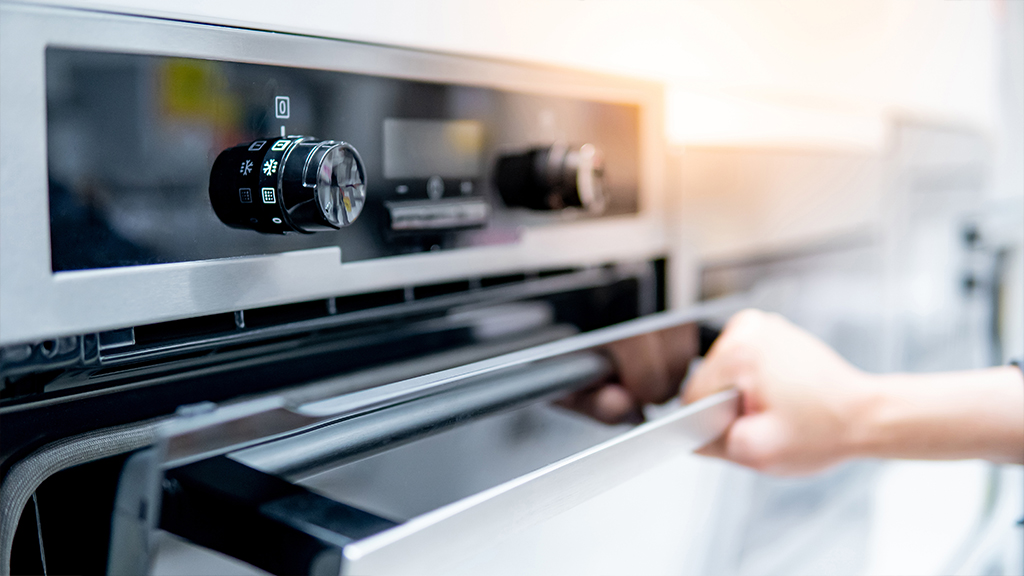Most ovens will vary in temperature. But if yours is getting too hot, don't worry. Years of heating and cooling can cause wear or accuracy loss. Fortunately, there are some simple solutions. Asurion Experts are trained and experienced with all major appliances, so they know how to get your oven's temperature under control.
Why is my oven getting too hot?
Here are the top five issues that could be causing your oven to overheat—and how to resolve them.
Thermostat knob
One common cause of an overheating oven is a damaged or loosened thermostat knob, which can produce faulty temperature settings. Check to make sure that your knobs are secured. If your knob is damaged, replace it immediately. Most knobs are cheap, but if you let the problem linger, it could lead to more expensive repairs in the future.
Blocked oven-vent
An oven vent helps circulate air throughout your appliance and helps keep it at an appropriate temperature. Covering this vent with a kettle, pots, aluminum foil, or anything else can affect the temperature. Dirt, grease, or grime may also cause vent blockages and lead to similar results. So, if your oven is overheating, keep your vent clear of anything that may block it and give your oven a good deep cleaning.

Psst... Got 2 minutes?
That’s how long it takes to get a care plan personalized for you:
✓ Coverage for thousands of devices ✓ Fast, quality fixes
✓ Hands-on help when you need it
Broken thermostat
Every oven has a temperature-controlled thermostat, and if you're dealing with a broken or overheating oven, an issue with the thermostat is often the cause.
Inaccurate temperature settings can ruin any meal. The best way to check and see whether this is the problem is to use a manual oven thermometer, which is inexpensive and available at most hardware stores as well as online. Place the thermometer in the center of your middle rack and preheat the oven. If the temperature you set with your thermostat isn't the same as your manual one, then it's likely time to replace your oven's thermostat. There are many steps involved in thermostat replacement and you'll want to ensure you get the correct parts for your oven's make and model, so we suggest reaching out to an oven repair expert for help.
Malfunctioning heating elements
The more you use your oven, the more likely you are to damage its heating elements. In most electric ovens, they are the two coils that are on the top and on the bottom. To check for heating element issues:
- First, turn off the electricity by unplugging it or switching off the circuit.
- Next, check the elements for visible signs of wear and tear.
- Then, detach the elements inside the oven by unscrewing them from their mounting plates.
- Finally, disconnect the wires that power the heating elements and check the elements with a multimeter. (Here's our guide for how to use a multimeter.) If that tool reads “no continuity," then the heating elements are causing your overheating issue.
Broken or misaligned temperature sensor
A temperature sensor ensures that your oven heats evenly. If it's no longer sitting in the proper position or if it's broken, the sensor is a likely cause behind your oven heating your food too quickly. To check that it's functioning properly:
- First, make sure your oven is unplugged from the power source and cooled.
- Then, look inside the oven to locate the temperature sensor, which is typically located in the top left corner.
- Make sure that the sensor is “floating" in the middle and is not touching the sides of its hole or the inside of the oven, as that can lead to inaccurate readings.
- If realigning it doesn't fix the problem, or if it appears broken altogether, you'll need to replace the sensor.
A DIY temperature sensor is not too challenging—refer to your oven's manual or enter the model into the manufacturer's website for information on the correct replacement parts and how to replace the sensor.
Reliable protection for the major appliances you rely on
When your appliances don't work, we do. With Asurion Appliance+®, you get hassle-free coverage and 24/7 troubleshooting support for your current and future appliances—no matter the brand or where you bought them. But it’s not the only care plan we offer. Take our 2-minute quiz to find the right care plan for your appliances and tech, or learn more about how you can get total peace of mind with Asurion Appliance+.

